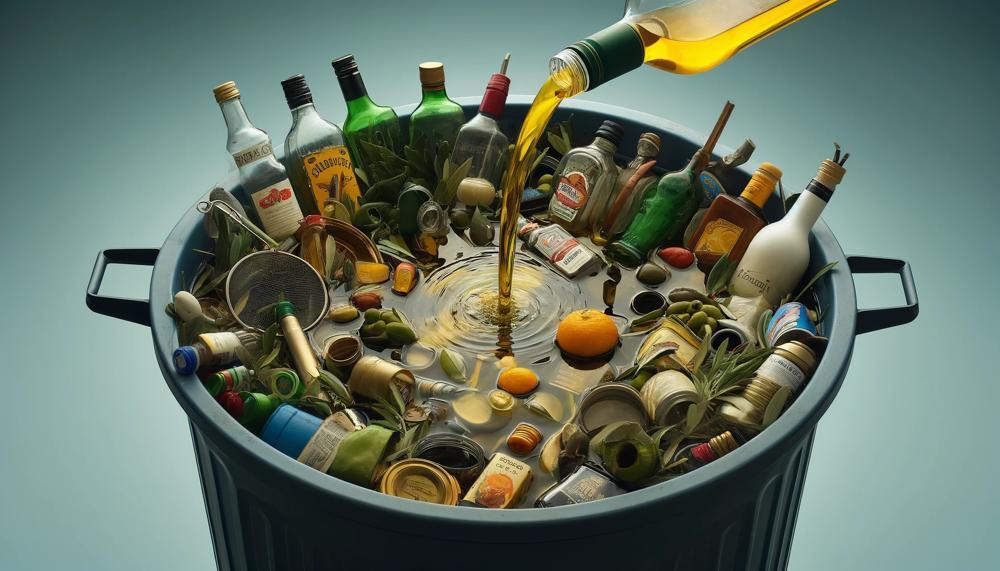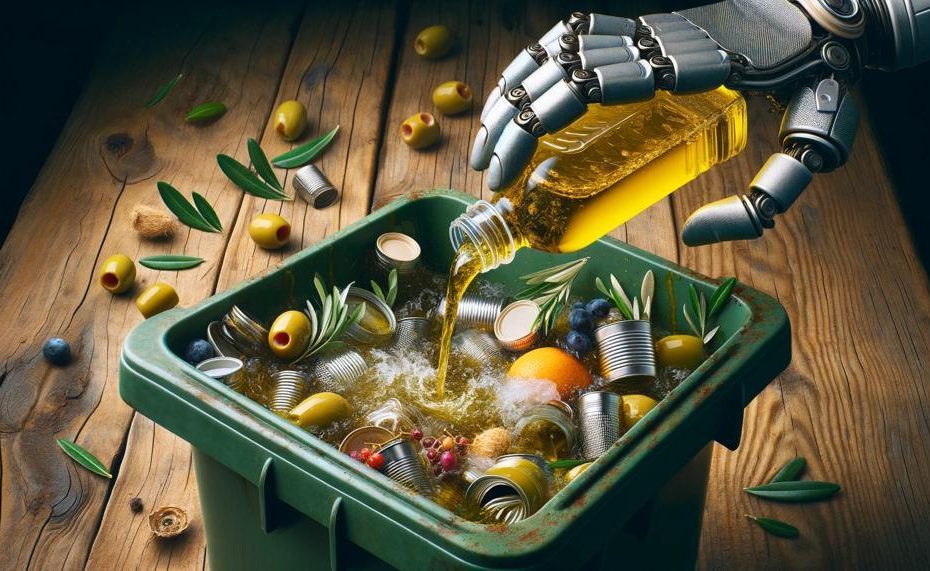Disposing of olive oil properly is crucial for both environmental and practical reasons. Surprisingly, just one liter of improperly disposed olive oil can contaminate up to one million liters of water.
Understanding the correct disposal methods can significantly reduce negative impacts on the environment and avoid plumbing issues at home.
Here’s what you need to know about disposing of olive oil:
- Reuse When Possible: Consider reusing olive oil that’s been lightly used, such as for frying or sautéing. It can often be strained and stored for future cooking.
- Solidify Before Disposal: Allow the oil to cool and solidify. Once solid, it can be scooped into a non-recyclable container with a lid and disposed of in the trash.
- Avoid Drains and Toilets: Never pour olive oil down the drain or toilet as it can solidify and clog pipes.
- Composting: Small amounts of solidified olive oil can be added to a compost bin, but in moderation, as excessive oils can disrupt the composting process.
- Recycling Centers: Look for local facilities that accept cooking oil for recycling. This oil can be processed and often converted into biodiesel.
This approach ensures that you handle olive oil waste responsibly while keeping your home plumbing clear and contributing to environmental sustainability.

Contents
Why Must It Even Be A Hassle To Dispose Of Olive Oil?
Disposing of olive oil thoughtfully is vital because it’s more than just a kitchen byproduct; it’s an environmental concern. Improper disposal, particularly down drains or in natural water bodies, can lead to significant issues like clogged plumbing systems and pollution. This oil can congeal and block not only your home pipes but also municipal sewage lines, leading to costly repairs and environmental clean-up efforts.
Olive oil, if discarded carelessly, can also negatively affect the ecosystem. When oil enters waterways, it forms a thin layer on the surface, obstructing oxygen flow into the water and harming aquatic life. Furthermore, the decomposition process of olive oil in natural environments can reduce oxygen levels in the water, further stressing wildlife.
To address these challenges, here’s a structured approach to disposing of olive oil, ensuring it’s done safely and responsibly:
| Method | Description | Environmental Impact |
| Reuse or Recycle | Before considering disposal, assess if the oil can be reused. For instance, oil used for frying can often be strained and reused. | Minimizes waste and reduces the need for new resources. |
| Airtight Container | Cool the oil and transfer it to an airtight, unbreakable container, then dispose of it with regular trash. | Prevents leaks into soil and water systems, reducing pollution. |
| Composting | Compost the oil if you have a robust compost system, but remember to balance with dry, carbon-rich materials. | Supports natural decomposition, but must be carefully managed to avoid disrupting the compost balance. |
Why is it Important to Dispose of Olive Oil?
Disposing of olive oil correctly is crucial because improper disposal can lead to significant environmental and plumbing issues. Pouring olive oil down the drain is particularly harmful as it can solidify and accumulate, leading to blocked pipes and costly repairs for homeowners and municipalities.
Moreover, when olive oil enters the sewage system, it complicates the water treatment process, potentially resulting in environmental pollution if treated water is discharged into natural water bodies.
To mitigate these issues, here are effective ways to dispose of olive oil responsibly:
| Method | Description | Benefits |
| Cooling and Solidifying | Allow the olive oil to cool and solidify, then place it in an airtight container for disposal. | Prevents leaks in garbage bags and keeps oil contained. |
| Composting | Add solidified olive oil to a compost heap if you have a setup that can handle small amounts of oils. | Supports waste reduction by turning oil into compost, enhancing soil. |
| Recycling Programs | Check for local facilities that accept cooking oils for recycling or proper disposal. | Ensures olive oil is processed in an environmentally friendly manner. |
By choosing one of these disposal methods, you not only protect your home’s plumbing but also contribute to environmental conservation, aligning with responsible waste management practices.
What is the Proper Way of Disposing of Olive Oil?
Disposing of olive oil properly is essential to avoid environmental harm and plumbing problems. Here’s a straightforward approach based on best practices:
- Cool and Solidify: Begin by allowing the oil to cool, then pour it into an old can or milk carton. Once solidified, it can be thrown away in your regular waste.
- Use an Airtight Container: If you cannot solidify the oil, place it in a sealed, unbreakable container to prevent leaks and odors, then dispose of it with your normal rubbish.
- Composting: Olive oil can be composted if used sparingly. Mix it with abundant dry materials like leaves or sawdust to aid the composting process without upsetting the balance.
- Recycling Programs: Check if your community offers a cooking oil recycling program. These facilities can repurpose oil into biofuels, supporting a circular economy.
Can You Reuse and Recycle Olive Oil?
Yes, you can indeed reuse and recycle olive oil. Let’s unpack how this works with both reuse and recycling practices.
Reuse:
Olive oil is remarkably durable and can be reused, making it a standout among cooking oils. According to a study by the American Chemical Society, olive oil showcases a higher resistance to degradation even after multiple uses compared to other oils.
This durability is attributed to its unique chemical structure, which maintains its quality and safety even after being subjected to heat repeatedly.
However, it’s important to note that reused olive oil might carry flavors from previously cooked foods. To manage this, it should be stored properly in a cool, dark place and used within a short period.
Recycling:
In terms of recycling, while olive oil cannot be ‘recycled’ in the conventional sense like plastics or paper, it can be repurposed effectively. For instance, used olive oil can be filtered and utilized for conditioning tools or making homemade soaps.
Additionally, some specialized recycling programs accept used cooking oil, including olive oil, to convert into biodiesel, offering an environmentally friendly disposal method.
Practical Tips for Handling Used Olive Oil:
- Storage: Keep the used olive oil in an airtight container away from light and heat.
- Reuse: Ideal for sautéing or frying foods at medium to low heat. Avoid using it at high temperatures to maintain its beneficial properties.
- Repurpose: Consider using it for non-cooking purposes like lubricating or as a base for creating natural products.
Conclusion
Proper disposal of olive oil is not just a culinary concern but an environmental imperative. As we navigate the intricacies of eco-friendly practices, it’s essential to regard olive oil disposal with the seriousness it demands. The environmental ramifications of improper disposal are profound, as olive oil can significantly contaminate water sources and clog drainage systems, leading to extensive damage and costly repairs.
To mitigate these risks, the most advisable routes include reusing the oil when possible or allowing it to solidify for safer disposal. For those looking to make a positive impact on the environment, local recycling centers provide a valuable service, converting waste oil into biodiesel and preventing environmental pollution.
Equally important is the use of airtight containers to prevent leaks when disposing of olive oil in trash receptacles. For the eco-conscious, adding small amounts of cooled, solidified oil to compost piles offers a way to enrich soil while adhering to sustainable waste management practices.
By choosing these responsible disposal methods, you not only safeguard your plumbing but also contribute to a healthier planet.





